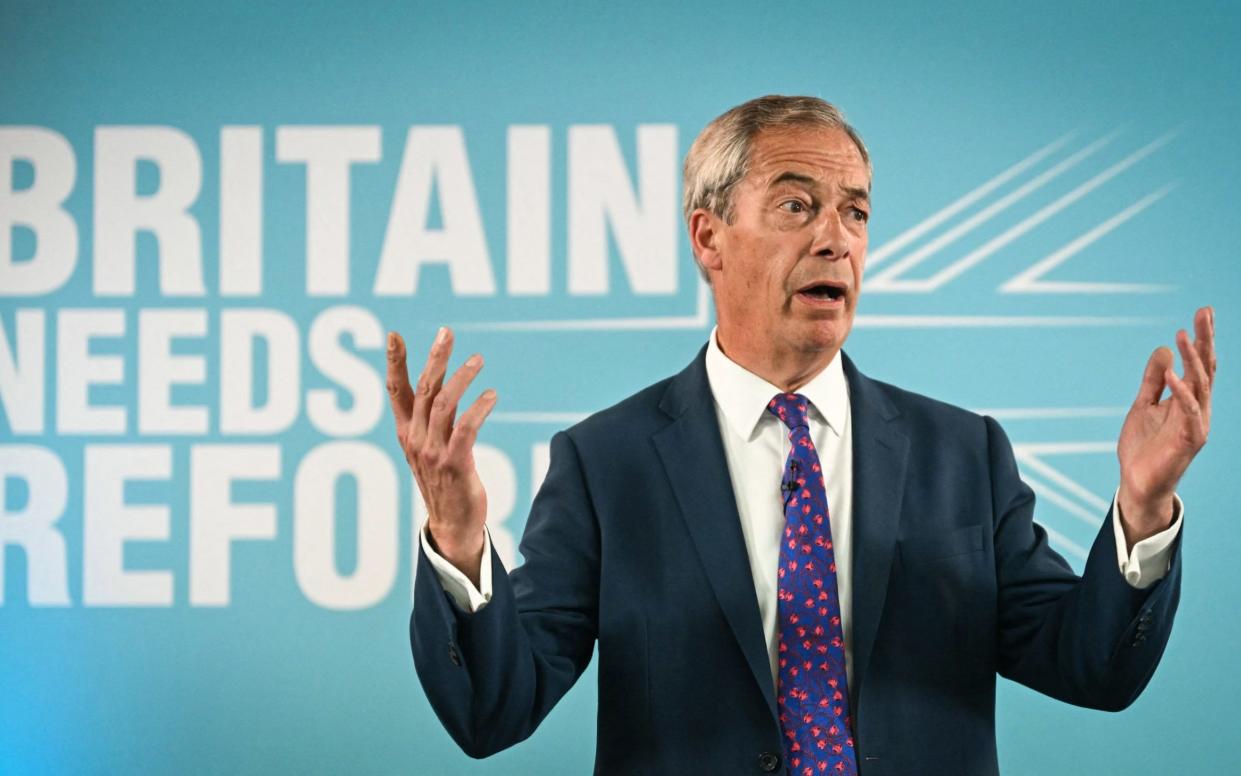Reform UK’s pitch: ‘The Conservative manifesto that never was’

Reform UK released its “contract with the people” on Monday, as Nigel Farage set out his party’s vision to repair a “skint” Britain.
The party’s manifesto includes a flagship pledge to “stop the boats” in its first 100 days in power as part of a four-point plan to curb illegal immigration.
The “contract” also includes plans to scrap net zero targets and ensure zero-tolerance policing.
Unveiling the document in Merthyr Tydfil in Wales, Mr Farage said “this is step one” in the planned rise of Reform UK, with the “real ambition” being the 2029 general election.
Following the launch, Telegraph readers were quick to offer their judgement on the party’s proposals.
‘The only programme offering genuine hope and change’
For many readers, including Dave Sutton, they view Reform’s manifesto as “the only programme for government offering genuine hope and change”.
Similarly, John Vaccaro believes that “there’s more substance to these policy ideas than from the Tories and Labour combined”.
“As a set of principles these would deliver real change to the lives of people across the country. No wonder the Conservative Campaign Headquarters are scrambling now with the project fear nonsense,” he added.
“What a breath of fresh air”, writes D. Hood. “The Tories and Labour will hate this, a contract that actually supports the people of this country.”
Regardless of whether one likes Reform’s policies, Cyril Carter felt the launch offered “some refreshing clarity”, which “embarrasses the Tory ‘definitely maybe’ approach”.
Some commend its true conservatism. Ian Robinson, for example, voices how the “contract” looks like “the Conservative manifesto that never was.”
Likewise, Alun Crockford writes: “I have just read what should have been the Conservative manifesto, and more to the point what the Conservatives should have been doing for the last fourteen years.”
Meanwhile, Hugh Soden praises their “fantastic conservative policies” and thinks the manifesto “would at one stroke put a rocket up the UK economy, curb immigration, halve crime and above all, give Britain some backbone and pride.”
Others, such as Dr Moss, praise Reform’s focus on “fixing things at home first”, in particular, “halting uncontrolled immigration”.
“Things that matter for British people,” he says.
In a similar vein, Reform has Ken Platt’s vote because he believes “no other politician will stop the illegal boat immigrants”.
A number of readers, including Charles Sinclair, view Nigel Farage as their “last hope” when it comes to tackling immigration and “sorting out the problems mass immigration will cause in British society”.
‘The devil is in the detail. There are no exact details’
However, for some, the manifesto fails to address key areas of concern. Readers identified the holes in Reform’s policies, while a few felt the party’s plans would be opposed regardless.
For instance, M.D. thought both the manifesto’s economic policies were unfeasible. They wrote: “You only have to see what the manipulated markets are doing to stop the centre-Right in Europe to know this is not doable.”
Similarly, Mo Raslo thought the manifesto contained “all wonderful ideas, but a certain Liz Truss tried a few of these (threshold, IR35, etc) and the real bosses stood up and smacked the whole of the UK into oblivion.
“You don’t have the final say, the markets do.”
Meanwhile, John U. found issues with Reform’s plans for immigration and its apparent lack of detail on the matter – as the party proposes to “stop the boats” in its first 100 days in power.
The reader asked: “Exactly how would they do it? You can’t ‘send them back’ unless the receiving country agrees – and they don’t.
“Which Royal Navy/Border Force personnel would risk prosecution for manslaughter, as a dinghy could easily capsize in such an operation? Besides, the EU would rip up the Brexit deal if we even tried,” he said.
Sharing this sentiment was Mo F: “There are no specific details. Sure, leave the European Convention on Human Rights (ECHR), but that will not stop the boats. Also, how will you exactly return the boats to France? The devil is in the detail. There are no exact details.”
Spotting problems with Reform’s local government policies, Edmund Blackadder suggested: “Nigel needs to understand physical geography.”
“All councils in remote areas have higher council taxes because of distances... the Barnet formula does not reflect this enough and means local authorities have to put up council taxes to pay for their statutory obligations.”
Some like James Mundy felt the manifesto failed to address necessary institutional reforms. They were disappointed the manifesto contained “nothing on reestablishing parliament as supreme,” and questioned why there was no promised reform of the House of Lords, or “abolishment of the politicised Supreme Court”.
Meanwhile, G. Francis wanted to see a reduction to those on the public payroll. “This should include many Quangos and will ensure future generations are not lumbered by unacceptable pension payments.”
As for Nigel Farage’s future bid to become prime minister, while many readers advocate the idea, one anonymous reader labelled it a “bizarre fantasy” and another, Geoffrey Hollis, stated, “someone needs to tell Nigel that this is the UK, not the US. Here, we vote for an individual to be our MP. There they vote for someone to be president”.

 Yahoo News
Yahoo News 
